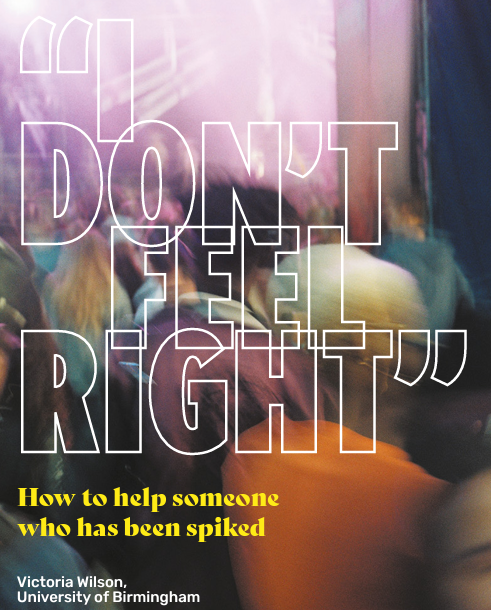Written by Victoria Wilson, University of Birmingham, May 2022
As part of Student Watch, our goal is to give each other the confidence to act when you see something awry. Plus, it’s always good to be on the safe side – so here’s some guidance on what to do...
Using alcohol or drugs to intoxicate somebody without their knowledge has become its own epidemic of late. Additionally, the act of being spiked has, over a longer period, become entrenched in shame and myths, as certain individuals and sections of the media make bizarre, dangerous comments that blame such incidents on victims’ clothing, behaviour or sheer existence. We all know this is, of course, ridiculous. Being spiked is never your own fault.
Spiking can take several forms. The most common, and well-known, is for drugs or alcohol to be slipped into somebody’s drink, to make them more intoxicated without their knowing. So-called ‘date-rape drugs’ such as Rohypnol are used to sedate victims, rendering them more vulnerable to physical and sexual assault, while recreational drugs such as Ketamine or LSD can incapacitate somebody, confusing them and making them lose inhibition or even memory. These drugs are worsened by the additional effects of alcohol. Attackers can also use needles to inject drugs into people, particularly in busy nightclubs or parties. If you suspect you’ve been injected with a dirty needle, you must seek urgent medical attention, because HIV and Hepatitis B don’t care if it was your intention or somebody else’s. Remember: spiking is still spiking even if you’re ‘just’ turning a friend’s single vodka into a double without their knowledge. It’s a criminal offence, and highly dangerous.
 1. On the night
1. On the night
If somebody tells you that they think they’ve been spiked, it’s essential to believe them, even if they seem okay to you. Symptoms can vary depending on the individual, the substance and what they’ve drunk that night already, but common signs are: feeling sleepy; feeling more drunk than usual, or just generally strange; confusion; lowered inhibitions; visual problems; loss of balance; nausea; and losing consciousness. You may have just bought a drink or a club ticket but you must still stay with them while you inform a member of staff or a sober friend – or, if the symptoms are very severe, call 999. Help them to a safe space, either in the venue or by accompanying them home in a taxi. Speak reassuringly and help them to feel comfortable and safe. Don’t leave them alone.
Remember: act immediately if you suspect someone has been spiked.
2. The morning after
Your spiked friend or acquaintance will likely feel confused and vulnerable, particularly if they can’t remember the night before. Talk with them about what happened and how they’re feeling now. If they feel up to it, you can report the incident to the venue and the police. Many spiking substances don’t show up in the body after 12 to 72 hours, so this should be done quickly if possible. However, making a report can be draining and harrowing for a someone who’s experienced being spiked, so don’t pressure them – and if they do file a report, work through it with them.
3. Going forward
It’s important to not just forget about the incident and move on. Continue to support your friend or acquaintance. They may become isolated or want to avoid going out, and there’s plenty you can do to ensure they feel seen and valued, whether it’s by organising a few relaxed movie nights in or by offering support when they are ready to go out again. If they’re experiencing symptoms of poor mental health, or even if they are not, you can guide them towards the wellbeing support options below. It’s crucial that they know what professional help is available, particularly in the case of suspected assault. Remember that your university may have additional resources available.
Rape crisis charity hotlines:
England & Wales: Call 0808 802 9999 from 12pm - 2.30pm & 7pm - 9.30pm every day
Scotland: Call 0808 801 0302 or text 07537 410 027 from 5pm - midnight every day
Northern Ireland: Call 0800 0246 991 Monday to Thursday from 6pm - 8pm
Samaritans: Call 116 123 or email jo@samaritans.org
CALM (Campaign Against Living Miserably): Call 0800 58 58 58 or webchat thecalmzone.net from 5pm - midnight every day
Read more crime advice written by students, for students, in The Lookout.
